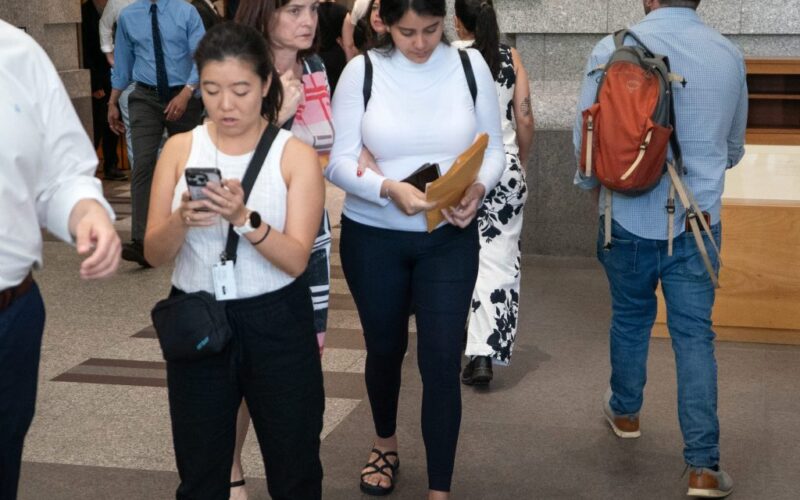Tears rolled down a pregnant woman’s face as she watched federal agents haul her husband away in a drab, fluorescent-lit waiting room outside an immigration courtroom Friday morning — a scene that has become commonplace in lower Manhattan immigration courthouses amid President Trump’s ramped-up deportation campaign.
The couple, identified as Ecuadorian migrants John and Marilyn, appeared in Judge James McKee’s courtroom on the 20th floor at 290 Broadway for an asylum hearing.
Initially, McKee stated their cases should be joined, given they crossed the southern border at the same time, and their shared reasons for fearing persecution back in Ecuador, according to city Comptroller Brad Lander and Councilwoman Tiffany Cabán, who observed their hearing.
But when a Department of Homeland Security attorney moved to dismiss John’s case and not Marilyn’s, McKee legally decoupled the cases, and “granted [the dismissal] without any dialogue or conversation,” Lander said.
With his case dismissed, John became immediately eligible for expedited removal, and vulnerable to immediate detention. Requesting case dismissals has become an increasingly common tactic by DHS.
Marilyn, standing with Lander’s wife at her side, wiped tears from her eyes as she watched five Immigration and Customs Enforcement agents, several wearing masks, walk John down the hall, before they disappeared to an unknown location.
“What that is is a family separation,” Lander said. “When we talk about the cruelty of what’s going on upstairs, we watched an arbitrary family separation for no legal reason whatsoever executed by a judge, and then by ICE agents.”
After the couple’s case, a man from New Guinea saw the same judge for an asylum hearing, with his attorney appearing virtually.
Cabán said it was made clear to everyone that the man did not speak English, yet no interpreter was provided to him.
“There was nobody there to explain what was going on to him,” Cabán said.

A DHS attorney made a motion to dismiss the case, and the migrant’s attorney objected, with a lengthy argument.
When asked to provide the government’s reasoning for dismissing the case, the DHS attorney stated there were “changed circumstances,” without elaborating, and added they “get to decide what’s in the best interest of the United States,” according to Cabán. McKee then granted the dismissal.
At the end of his hearing, the man sat down in a chair, unaware of what had just happened.
“Literally, a worker had to go and tap him on the shoulder and say, ‘You’re done,’” Cabán said. “That to me is a grave injustice that this person had no idea what just happened to them.”

After leaving the courtroom, a group of six federal agents lurking in the waiting area hauled the man away, one holding his wrist, the other holding him by the arm.
A third man, whose case was dismissed by the same judge, was taken away by federal agents less than 10 minutes later.
Cabán, along with state Assemblywoman Jessica Gonzalez-Rojas, led a group of roughly 10 advocates in surrounding the third man, two linking arms with him.
As the group headed for the elevator bank, a uniformed U.S. Border Patrol agent shoved his way through the mass of bodies, toward the migrant, as other agents joined in trying to get to him.
One advocate continued to hold onto the man’s arm while shielding him with her body.
An agent then yelled, “You’re impeding! Let go! Stop! You guys will go to jail if you impede.”
Holding the man by his arms, a plainclothes agent and the uniformed U.S. Border Patrol agent then led him away.
Another migrant, from Liberia, waiting to see the judge, sat in the waiting room with her infant daughter, watching as John and the other migrants were taken away by agents.
Seemingly shaken from witnessing the three arrests, the woman broke down crying in the waiting room after her hearing, at which the judge granted a continuance of her case.

At one point, the woman fell to the ground and began to pray.
“It is a deeply traumatic, evil place upstairs,” Lander said. “It is not justice, and it’s a shame right now on the United States of America.”
Lander, who is running for mayor, was arrested by ICE agents Tuesday alongside a migrant named Edgardo, whom he linked arms with while walking him from the courtroom toward the elevator bank inside 26 Federal Plaza. On Friday, Lander, accompanied by his wife and daughter, seemed to trail a short distance behind the groups of advocates escorting migrants to elevators inside 290 Broadway.
In recent weeks, a growing number of volunteers have appeared in immigration courthouses for “ICE watch” shifts, organized by numerous advocacy groups, including Immigrant Arc and Jews for Racial and Economic Justice.
Volunteers inform migrants of their rights as they head into courtrooms, and then escort them to the elevators, where federal agents often wait, on their way out.
“We have to find ways to gum up the works of this hideous system,” Lander told reporters outside the courthouse. “We are going to have to in the tradition of nonviolent witness bearing and resistance, find more and better ways not to allow our democracy to be eroded, not to allow people’s rights to be trampled, not to allow due process to be disappeared.”
Lander also called on Mayor Adams to add $170 million in funding for legal service programs in the city’s budget, in efforts to get more migrants legal representation in court.
“It’s a kangaroo court, if you don’t have a lawyer, and you don’t speak English, and your rights are being ripped out from under you, and there’s no one there to help you with it,” Landers said. “Having a lawyer matters.”








